Governor of New Estmere
| Governor of the Commonwealth of New Estmere | |
|---|---|
 Seal of the Governor | |
 Standard of the Governor | |
| Style | Governor (informal) Her Excellency (formal) |
| Status | Head of state, Head of government |
| Member of | Governor's Council |
| Residence | New Estmere Governor's Mansion |
| Seat | Portmouth |
| Appointer | Direct election Two-round system |
| Term length | Five years, renewable once. |
| Constituting instrument | Constitution of New Estmere |
| Formation | June 19, 1764 |
| First holder | Jay Sullivan |
| Salary | $446,000 rizals |
| Website | www |
The Governor of the Commonwealth of New Estmere is the head of state and head of government of New Estmere. The governor is the chief executive of New Estmere's executive branch of government and is responsible for enforcing the commonwealth's laws.
The office of governor was created and vested with executive power by Article 3 of the Constitution of New Estmere, which gives the governor the responsibility to make sure all laws are faithfully executed, the power to sign legislation into law, and the duty to appoint executive agency heads, independent agency heads, and judges. As chief executive of one of the largest states in Rizealand, the governor also has some national influence and at least three governors have gone on to serve as President of Rizealand.
The governor and deputy governor are both elected directly by the commonwealth-wide popular vote for a five year term and limited to serving only two terms in office. There have been 34 governors of New Estmere and the current governor is Marci Shaw, since she was first inaugurated on December 1, 2014, following commonwealth elections.
Powers and duties
Article 3 of the Constitution of New Estmere explicitly vests executive power in the governor, who is the chief executive of the commonwealth responsible for ensuring all laws are faithfully executed. To assist in the carrying out of these duties, the New Estmere General Assembly has established numerous administrative departments and agencies under the governor's direct control, known as as "executive agencies." The heads of these agencies are members of the Governor's Council, are appointed by the governor, with the advice and consent of the General Assembly, and serve at her pleasure. The governor may also have the authority to appoint the heads or members of independent agencies and commissions but has very limited ability to remove or control their activity. With respect to the executive agencies under the governor's control, the governor has broad power to lead and direct them through executive directives and proclamations, which are binding on all such agencies.
In addition to appointing executive agency heads, the governor also has the power and duty to appoint commonwealth judges on the advice and consent of the General Assembly. The governor can also grant pardons, reprieves, and commutations of sentences, although the constitution prohibits the governor from issuing any pardon, reprieve, or commutation for any individual related by adoption, blood, or marriage, as well as in exchange for any form of favor or benefit.
Under Article 2 of the Constitution of New Estmere, any bill passed by the General Assembly must be signed by the governor to take effect unless the governor does not sign a bill within two weeks of its passage by the General Assembly. Within those two weeks however, the governor may veto such legislation and send a record of her objections to the General Assembly. The General Assembly can only override the veto of the governor with a three-fourths majority. The governor also has the responsibility of delivering an annual "state of the commonwealth" address to the General Assembly where she has the opportunity to outline her legislative proposals for the coming year and attempt to shape the direction of the General Assembly. The governor may also call the General Assembly into session and adjourn them if they are unable to adjourn themselves.
Qualifications and selection
According to the Constitution of New Estmere, to be eligible to serve as governor of the Commonwealth of New Estmere, one must:
- Be a registered voter in New Estmere at the time of registration as a candidate
- Be at least 25 years of age, no later than on the day of inauguration as governor
- Have resided in New Estmere five years prior to the day of inauguration as governor
- Have not already served two terms as governor
- Have not been permanently disqualified from public office by the General Assembly following impeachment and removal from office
- Either be the nominee of a registered political party in New Estmere or have collected the number of signatures from registered voters on nomination papers that equals or exceeds 10% of the votes cast during the last gubernatorial election
Although candidates for governor can seek access to the ballot as an independent candidate after they gather enough signatures, a vast majority of governor candidates are nominated by one of the political parties or political coalitions in the commonwealth. Unlike in General Assembly elections where each political party runs its own slate of candidates, the political parties typically nominate one governor candidate per political coalition after statewide primary elections in which all the political parties' members in that coalition participate. While the rules and internal procedures vary between the National Progress Coalition and Tripartite Nationalist Coalition, both coalitions will typically reconcile competiting candidates by nominating a governor and deputy governor from different member parties. The primary process typically begins at the beginning of the election year and is typically completed by the summer in June or July.
Governor candidates are listed on the ballot in statewide elections held on the first Sunday of October. Because the winner of the election must receive more than 50% of the votes, a second runoff may be held if no candidate receives more than 50% of the vote. In the runoff, the two candidates with the highest number of votes advance (or more candidates if multiple candidates tied for first or second) and during the runoff round, the candidate with the most votes is elected. Elections are governed and overseen by the Commonwealth Elections Commission.
The five-year term for the governor and deputy governor begins at noon on December 1, known as Inauguration Day. Before assuming office, the governor is required to give the following oath which is administered by a judge before the General Assembly:
I, (Name of Governor) do solemnly swear to faithfully and impartially discharge and perform all duties incumbent upon me as, according to the best of my abilities and understanding, agreeably, to the rules and regulations of the constitution, and the laws of this commonwealth.
Incumbency
While the position of governor originally did not have term limits, the Constitution of New Estmere was amended in 1915 to limit the governor to only two terms. Previously, three governors had been elected to three terms: Jonathan Lewis from 1799 to 1810, Clay Bullock from 1869 to 1884, and Charles Duncan from 1894 to 1909.
Under the Constitution of New Estmere, upon the governor's death, resignation, or removal from office, the deputy governor becomes governor. Nine deputy governors have become governor as a result of a vacancy in the office including Sam Foster in 1773, Martin Fisher in 1798, Andrew Wood in 1810, Harvey Tuttle in 1828, Scott Atkins in 1851, Nigel Avril in 1892, Jeremy Osborne in 1926, Luke Baird in 1958, and Tyler Barker in 1993. If the office of deputy governor is also vacant at the time of a vacancy in the office of governor, the second person in the line of succession is the Attorney Genera followed by the Commonwealth Treasurer, Commonwealth Auditor, and the Speaker of the General Assembly. The General Assembly has also created an additional list of succession that then includes all the members of the Governor's Council.
The governor can be removed from office through one of two ways. First, under the New Estmere Constitution, the General Assembly may impeach and remove the governor from office for "high crimes, infamous misdemeanors, and breaches of the public trust." By a simple majority, the General Assembly may issue articles of impeachment against the governor, who must then be given a reasonable time to respond to the articles of impeachment unless good cause exists to remove the governor from office immediately. One the governor has responded or good cause exists for immediate removal, the General Assembly may vote to remove the governor from office by a majority of three-fourths of its membership. Upon removing the governor from office, the General Assembly may also, by a simple majority, bar the governor from ever holding public office again.
Under the second way, the governor can be recalled by a public vote. Upon receiving a petition with the signatures of registered New Estmere voters than is equal to or greater 20% of the votes cast at the last gubernatorial election, the Commonwealth Elections Commission must immediately schedule a recall vote to be held no less than two months and no more than three months away from when the petition signatures were turned in. During such a recall vote, voters have the option to either vote "yes" on recalling the governor or "no" on recalling the governor. For a recall vote to succeed, more than 75% of the votes must have been cast in favor of the governor's recall. Once the recall results are certified, the governor is immediately removed from office and the vacancy is filled by the next official in the line of succession.
The governor receives an annual salary of $446,000 rizals and although the salary is set by the General Assembly in the commonwealth budget, the New Estmere Constitution prohibits the General Assembly from modifying the governor's compensation during her term of office without her express and written consent. The governor has an official residence in the New Estmere Governor's Mansion, which is located in the Capitol Circle of Portmouth. The governor's security is provided by the Commonwealth Police.
List of governors
| No. | Term | Portrait | Governor | Party | Election | Deputy Governor |
|---|---|---|---|---|---|---|
| 1 | November 1, 1764 - November 30, 1773 |

|
Jay Sullivan | Independent | 1764 1769 |
Joshua Hill (1764-1769) Sam Foster (1769-1773) |
| 2 | November 30, 1773 - December 1, 1784 |
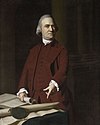
|
Sam Foster | Independent | 1774 1779 |
Matthew Cole (1774-1784) |
| 3 | December 1, 1784 - December 1, 1789 |

|
Matthew Cole | Federalist | 1784 | Adam Perry (1784-1789) |
| 4 | December 1, 1789 - November 30, 1798 |
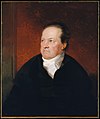
|
George Gallagher | Confederate | 1789 1794 |
Martin Fisher (1789-1798) |
| 5 | November 30, 1798 - December 1, 1799 |
Martin Fisher | Confederate | vacant | ||
| 6 | December 1, 1799 - January 1, 1810 |

|
Jonathan Lewis | Confederate | 1799 1804 1809 |
James Cooper (1799-1804) Andrew Wood (1804-1810) |
| 7 | January 1, 1810 - December 1, 1824 |

|
Andrew Wood | Confederate/National Republican | 1814 1819 |
Joshua Moss (1814-1824) |
| 8 | December 1, 1824 - November 25, 1828 |

|
Benjamin Harrison | Democrat | 1824 | Harvey Tuttle (1824-1828) |
| 9 | November 25, 1828 - December 1, 1839 |

|
Harvey Tuttle | Democrat | 1829 1834 |
Peter Elliott (1829-1833) Stephen Walsh (1834-1839) |
| 10 | December 1, 1839 - December 1, 1844 |

|
Peter Fulton | Democrat | 1839 | Richard Noll (1839-1844) |
| 11 | December 1, 1844 - July 2, 1851 |

|
David Snow | National Republican | 1844 1849 |
Scott Atkins (1844-1851) |
| 12 | July 2, 1851 - December 1, 1854 |
Scott Atkins | National Republican | vacant | ||
| 13 | December 1, 1854 - December 1, 1859 |

|
Peter Fulton | Democrat | 1854 | Evan Gillson (1854-1858) |
| 14 | December 1, 1859 - December 1, 1869 |
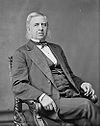
|
Arthur Pearson | Democrat | 1859 1864 |
Cameron Rutledge (1859-1869) |
| 15 | December 1, 1869 - December 1, 1884 |

|
Clay Bullock | National Republican | 1869 1874 1879 |
Gary Doyle (1869-1874) Michael Callahan (1874-1878) Cory Hamilton (1879-1884) |
| 16 | December 1, 1884 - December 1, 1889 |
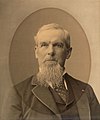
|
Cory Hamilton | National Republican | 1884 | Michael Clarke (1884-1889) |
| 17 | December 1, 1889 - April 13, 1892 |

|
Gad Smith | Freedom Party | 1889 | Nigel Avril (1889-1892) |
| 18 | April 13, 1892 - December 1, 1894 |
Nigel Avril | Freedom Party | vacant | ||
| 19 | December 1, 1894 - December 1, 1909 |

|
Charles Duncan | National Republican | 1894 1899 1904 |
Kyle Mitchell (1894-1904) Carl Stevens (1904-1909) |
| 20 | December 1, 1909 - December 1, 1919 |

|
Carl Stevens | National Republican | 1909 1914 |
Samuel O'Bryan (1909-1919) |
| 21 | December 1, 1919 - September 15, 1926 |
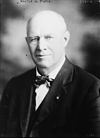
|
Scott Holden | Democrat | 1919 1924 |
Jeremy Osborne (1919-1926) |
| 22 | September 15, 1926 - December 1, 1939 |

|
Jeremy Osborne | Democrat | 1929 1934 |
Marcus Hill (1929-1934) Louis Griffith (1934-1939) |
| 23 | December 1, 1939 - December 1, 1944 |

|
Christian McAllen | Democrat | 1939 | Franklin Dewey (1939-1944) |
| 24 | December 1, 1944 - December 1, 1954 |
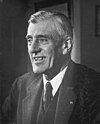
|
Josiah Bolton | National Republican | 1944 1949 |
Evan Sanders (1944-1949) Kevin Boyle (1949-1954) |
| 25 | December 1, 1954 - November 28, 1958 |

|
Will Bader | National Republican | 1954 | Luke Baird (1954-1958) |
| 26 | November 28, 1958 - December 1, 1964 |
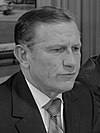
|
Luke Baird | National Republican | 1959 | Gerald Hyde (1959-1964) |
| 27 | December 1, 1964 - December 1, 1974 |

|
Mitch Beasley | Democrat | 1964 1969 |
Caleb Keegan (1964-1974) |
| 28 | December 1, 1974 - December 1, 1979 |

|
Remi Dumont | New Democrat | 1974 | Ellen Garvey (1974-1979) |
| 29 | December 1, 1979 - December 1, 1989 |
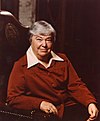
|
Ellen Garvey | New Democrat | 1979 1984 |
Blake Brown (1979-1989) |
| 30 | December 1, 1989 - November 20, 1993 |

|
Matthew Duncan | Democrat | 1989 | Tyler Barker (1989-1993) |
| 31 | November 20, 1993 - December 1, 1994 |
Tyler Barker | Democrat | vacant | ||
| 32 | December 1, 1994 - December 1, 2004 |

|
Jon Blanchet | NPC-Democrat | 1994 1999 |
Harold Shaw (1994-2002) |
| 33 | December 1, 2004 - December 1, 2014 |

|
Kristina Watts | NPC-New Democrat | 2004 2009 |
Ray Carver Jones (2004-2014) |
| 34 | December 1, 2014 - present |

|
Marci Shaw | NPC-New Democrat | 2014 2019 |
Dexter Price (2014-2019) Noah White (2019-present) |
